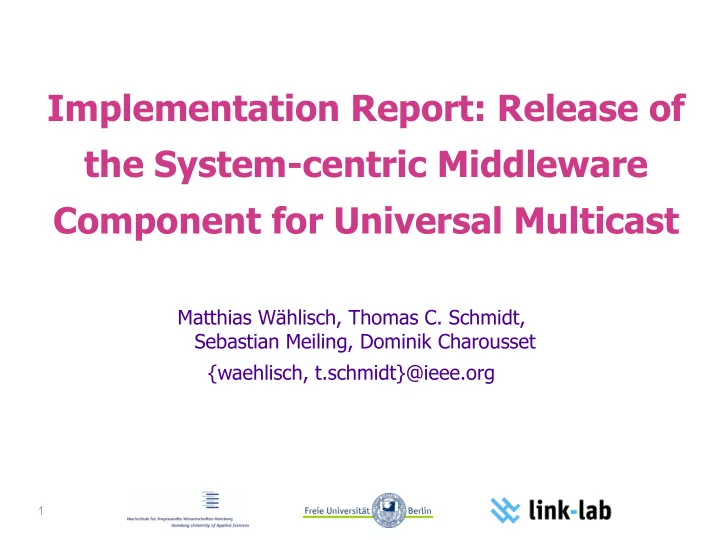

Implementation Report: Release of the System-centric Middleware Component for Universal Multicast Matthias Wählisch, Thomas C. Schmidt, Sebastian Meiling, Dominik Charousset {waehlisch, t.schmidt}@ieee.org 1
Agenda Middleware Overview 1. Update Performance Evaluation 2. Mini-Tutorial 3. Conclusions & Outlook 4. 2
Middleware Implementation at a Glance o Implements common multicast API o Implemented in C/C++ including boost library o Multi OS support: - Currently Mac OS and Linux o Several supported technologies - IPv4/v6, Scribe, ASM, SSM o Middleware runs as user space daemon - Implements transition between technologies o Application programmer just uses HAMcast library 3
Middleware Architecture 4
Evaluation Update o Analyzing system performance of HAMcast prototype o Single sender-receiver scenario o Hardware: - Hosts with QuadCore CPU, 8 GB RAM - Network link with bandwidth of 1 Gbit/s o Comparison of HAMcast-IP, HAMcast-OLM, and IP Multicast o Metrics: throughput, loss, and CPU usage o Packet payload size from 100 to 1,400 Bytes 5
Throughput Receiver Sender 6
Packet Loss 7
CPU Usage Receiver Sender 8
MINITUTORIAL LET’S DO SOME PRACTICAL 9
Download & 3rd Party Dependencies o http://www.realmv6.org/hamcast_dev_downloads.html o Required tools and libs - build tools (gcc ...) - automake + libtool - Boost library (1.42 or higher) - SSL developer library - PCAP developer library o Almost standard libs … - Packages are available for Ubuntu and Debian 10
Installation o Implementation consists of four parts Multicast API ( libhamcast/ ) 1. Middleware component ( middleware/ ) 2. Technology modules ( modules/<technology> ) 3. Examples ( programs/<software> ) 4. o Two alternatives: - ./build.sh compiles the complete implementation - Per subdirectory: automake -i && ./configure && make o It‘s quite easy to install the HAMcast middleware ☺ 11
Start the HAMcast Middleware o Create configuration file for the middleware - cp middleware/middleware.ini.example middleware/middleware.ini o Select modules of interest [global] log_level=error - Linux *.so, MacOS *.dylib [void_module] - Example configuration � file=../modules/void/.libs/libvoid_m odule.dylib o Start the middleware [loopback_module] - ./run_hamcast.sh file=../modules/loopback/.libs/liblo opback_module.dylib [ip_module] file=../modules/ip/.libs/libipv4modu 12 le.dylib
Code Example 1: Join & Receive hamcast::uri group; group = "ip://239.0.0.1:1234"; hamcast::multicast_socket s; s.join(group); hamcast::multicast_packet mp; while(true) { if (s.try_receive(mp, 50)) { std::string tmp; const char* msg = reinterpret_cast<const char*>(mp.data()); std::copy(msg, msg + mp.size(), std::back_insert_iterator<std::string>(tmp)); tmp += '\n'; cout << tmp; cout.flush(); } 13 }
Application Example: Video Lecture 14
Code Example 2: Service Calls #include <limits> #include <iostream> #include "hamcast/hamcast.hpp" #include "hamcast/ipc.hpp“ #include <boost/thread.hpp> using std::cout; using std::endl; int main(){ std::vector<hamcast::ipc::interface_property> vec; vec = hamcast::ipc::get_interfaces(); cout << "list of middleware interfaces:" << endl << endl; for (size_t i = 0; i < vec.size(); ++i) { cout << "interface[id = " << vec[i].id << "]:" << endl << "\tname = " << vec[i].name << endl << "\taddress = " << vec[i].address << endl << "\ttechnology = " << vec[i].technology << endl << endl; } return 0; 15 }
Application Example: Monitoring 16
Future Release o Passive service discovery - Based on kernel tables o Scribe module - Based on Chimera implementation - Public bootstrap node hosted @ HAW Hamburg o More example applications included - Multicast monitoring & chat will be published o Improved installation script 17
Conclusions & Outlook o Improved performance for HAMcast middleware o Middleware is easy to install and easy to use o New distribution technologies available soon Download, Install, and have Fun! � http://www.realmv6.org/hamcast/hamcast.tar.gz 18
Recommend
More recommend